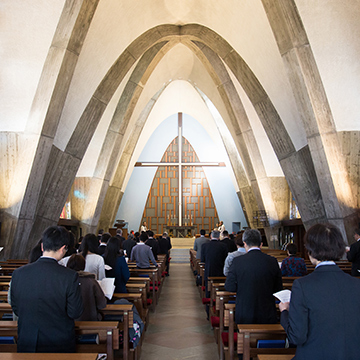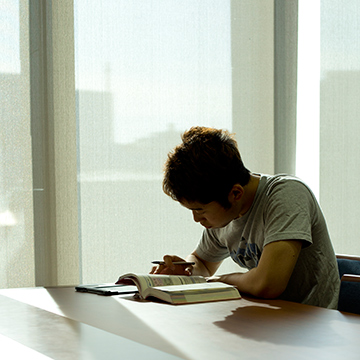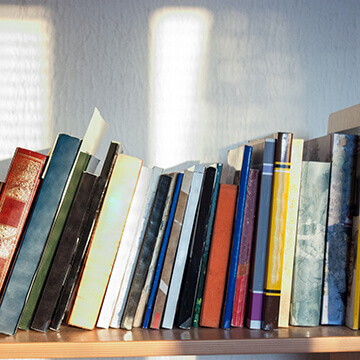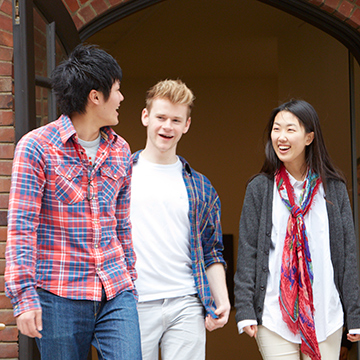College of Arts
Ikebukuro Campus
OBJECTIVE.
Transcending time and space to pursue the true nature of humanity and human culture.
About
College of
Arts
Humanities is the area of study that considers and analyzes the different literature, language and culture of humanity and fields related to humanity from comprehensive, multifaceted perspectives, and aims to use the insights gained to interpret language and grasp the true form of humanity, and to continue to create the ideal form of humanity and society beyond the limits of time and space.
To this end, the College of Arts creates flexible curricula which allow students to study beyond the boundaries of courses and departments. We re-frame the academic achievements and heritage built by our predecessors, equip ourselves with the wisdom to see the true nature of things without being misled by “taken-for-granted assumptions,” and seek out methods to pursue the elusive aspects of humanity.
Departments
-
Department of Christian Studies
We explore Christianity from a variety of perspectives and nurture thoughtful people with a thorough understanding of different cultures and cosmopolitan sensitivity.
Three Features of the Department of Christian Studies—What does studying at this department mean?
1.Christian Studies is open to anyone.
Students study how Christianity has influenced, and has been influenced by the history and cultures of the world. As our goal is to study cultures, thought, art, and more around the world from diverse perspectives, the Department is open to all, regardless of whether or not they subscribe to the Christian faith.
2.Small class sizes as a rule.
We provide education in small classes that match the interests of individual students, such as Christianity and Science, Christianity and Cinema, and Christianity and Modern Society.
3.Students can also study Greek, Latin, and Hebrew languages.
The original text of the Bible was written in Hebrew, and then translated into Greek and Latin. The Department of Christian Studies offers classes where students interpret texts written in each of these languages.Abilities and knowledge acquired at the Department of Christian StudiesーWhat abilities does this department cultivate?
The ability to understand different cultures and develop a cosmopolitan sensitivity.
It is said that roughly one in three members of the world’s population are Christian. In addition to understanding different cultures by understanding this widely-held faith, students can also acquire a cosmopolitan and historical sensitivity.
The ability to perceive the true nature of problems.
In seminars, students actively carry out their own research and study of specific themes, and then critically review the knowledge they have gained through fieldwork. In doing so, students develop the ability to perceive the true nature of problems.
The ability to carry out research independently, and present and debate findings.
Students acquire a solid grounding in the fundamentals of gathering and organizing resources, analyzing data, and writing reports. By presenting and debating their findings repeatedly, students strengthen these abilities. -
Department of Letters Course of English and American Literature
We study English-speaking cultures to produce confident critical thinkers who can express themselves with strong English language skills.
Three Features of the Course of English and American Literature—What does studying at this department mean?
1.Study of literature and culture in English.
Students come into contact with people’s ways of living and thinking through the language, literature, and culture of English-speaking areas across the world, including Asia and Africa, and through media such as film, music, art, and periodicals.
2.We focus on practical study.
“What will you do with the English you have learned?” We provide well-rounded, practical study programs to help you answer this question. For example, students can improve fundamental abilities such as language expression, openness to different cultures, and on-site research skills through overseas field study.
3.Students can also choose studies that match their interests from subjects covering a wide range of fields.
Students learn the foundations in the first and second years, and in the third and fourth years, establish a course plan on their own in accordance with their interests, covering fields such as literature, culture, and language, with a focus on seminar-based classes.Students can choose one course from the five offered by the Department of Letters. It is also possible to take subjects of interest from other courses.
The Rikkyo University College of Arts’ Department of Letters consists of five courses: the Course in English and American Literature, the Course in German Literature, the Course in French Literature, the Course in Japanese Literature, and the Course in Philosophy and Creative Writing. Each course has different admission requirements and makes its own admission decisions.
Students can study specialized subjects in their course, while also taking subjects from other courses at the same time. It is also possible to receive credits from other departments.Abilities and knowledge acquired at the Course of English and American LiteratureーWhat abilities does this department cultivate?
Acquire strong English language skills.
Study the English language and English and American literature in English, in small classes taught by native English-speaking instructors. Through reading, listening, and presenting in English, students acquire English-language skills that can be used in real communication.
The ability to create a new self.
By studying numerous works of English and American literature, students can acquire diverse perspectives that their previous selves did not have. Through this process, students acquire the ability to objectively examine their own words and ways of thinking.
The ability to understand English and American literary works.
In the seminars, students are involved in the close reading of novels, poetry, and other works of English and American literature. Through presentations and discussions of these works, students acquire the foundations necessary for researching literature, such as ways of reading and the ability to deeply understand literary texts. -
Department of Letters Course of German Literature
We explore German literature and German-speaking cultures to produce globally-minded people with a rich intellect.
Three Features of the Course of German Literature—What does studying at this department mean?
1.Instruction in the German language and solid support for studying abroad.
Students take part in intensive study of German language up to the second year, as part of a curriculum that leads up to acquiring official German certification in German-language proficiency. We also send students to study abroad at universities such as the University of Tübingen, the Humboldt University of Berlin, and the University of Bonn.
2.Engage in broad study of German-speaking cultures.
In addition to German literature, we also explore topics such as the music of Vienna, sports, design, and environmental efforts. Additionally, we study German culture, which had a massive influence on the modernization of Japan.
3.A communicative approach to studying German.
In the seminars, students work toward being able to make arguments in German, by finding their research themes in diverse areas of study and taking part in research presentations and debates.Students can choose one course from the five offered by the Department of Letters. It is also possible to take subjects of interest from other courses.
The Rikkyo University College of Arts’ Department of Letters consists of five courses: the Course in English and American Literature, the Course in German Literature, the Course in French Literature, the Course in Japanese Literature, and the Course in Philosophy and Creative Writing. Each course has different admission requirements and makes its own admission decisions.
Students can study specialized subjects in their course, while also taking subjects from other courses at the same time. It is also possible to receive credits from other departments.Abilities and knowledge acquired at the Course of German LiteratureーWhat abilities does this department cultivate?
Practical proficiency in German language.
Our seminars are taught by native German-speaking instructors, using teaching materials used in German-speaking communities. We also offer German language proficiency test preparation and German composition classes. Students acquire practical German language skills through well-rounded language study programs.
Diverse perspectives rooted in German literature and culture.
Literature covering poetry, drama, novels, children’s literature, and German thought, as well as fine art, architecture, cinema, music, and more. By approaching German literature and culture through international relationships and cross-cultural comparison, students learn to objectively examine their own words and ways of thinking.
The ability to read, write, and express oneself in German.
Reading and writing is more valuable than anything else. As such, we provide numerous classes where students interpret texts, present their findings, and debate with each other. Through these studies, students improve their ability to express themselves. -
Department of Letters Course of French Literature
We explore the France of today.We develop people with a solid human grounding and a global perspective.
Three Features of the Course of French Literature—What does studying at this department mean?
1.Study France, from the basics of French studies through to the arts of France.
In the first year, we provide introductory subjects to study French culture, writers, and artists. Following on from this, the subjects expand into various areas of studies, such as subjects that delve into novels and poetry, culture, thought, philosophy, as well as subjects in the fields of arts.
2.Solid support for studying abroad.
We send students to study abroad at universities in France every year, including Paris Diderot University, University of Paris-Est, and Jean Moulin University Lyon III. We also provide three-week intensive language courses in France during the summer. In addition to the French language, students also deepen their understanding of French culture.
3.The faculty covers a wide range of fields and periods of history.
Each faculty member of the Course in French Literature specializes in different periods of French history, providing an almost seamless chain of specialization in the literature and thought of France from the medieval period to the modern era. Additionally, they cover a wide range of fields surrounding their areas of specialization.Students can choose one course from the five offered by the Department of Letters. It is also possible to take subjects of interest from other courses.
The Rikkyo University College of Arts’ Department of Letters consists of five courses: the Course in English and American Literature, the Course in German Literature, the Course in French Literature, the Course in Japanese Literature, and the Course in Philosophy and Creative Writing. Each course has different admission requirements and makes its own admission decisions.
Students can study specialized subjects in their course, while also taking subjects from other courses at the same time. It is also possible to receive credits from other departments.Abilities and knowledge acquired at the Course of French LiteratureーWhat abilities does this department cultivate?
Practical French language skills.
We tailor our French language classes to the interests and needs of individual students in order to develop practical French language skills. Aside from just grammar, we equip students with real-world French language skills through classes covering subjects such as reading and conversation.
The cultivation needed for global society.
See the world while studying modern France and the French-speaking cultures and societies. Learn about the world today while studying the history, literature, and thought of French-speaking societies from the medieval period and the Renaissance through to the 20th century. These experiences provide students with the educational cultivation to thrive in global society.
A perspective to understand the world in relative terms.
Through consideration of France, students learn about not only the West, but also the Islamic world and Asia as well, gaining a new understanding of Japan in the process. We help students develop a perspective to understand the world in relative terms. -
Department of Letters Course of Japanese Literature
We develop people who can adopt Japanese and global perspectives to explore Japanese literature and culture from antiquity to present.
Three Features of the Course of Japanese Literature—What does studying at this department mean?
1.All areas of Japanese literature are the object of our study.
We select a diversity of topics and themes from all areas of Japanese literature, from antiquity to the modern and contemporary eras, and provide lectures and seminars. Using the interests and concerns of students as a catalyst, we respond thoroughly to the intellectual curiosity of each student.
2.We study Japan through Chinese literature and thought.
We also have a well-rounded set of subjects relating to Chinese literature and thought, which have a deep relationship with Japanese literature. In addition to aiming to improve students' ability to comprehend texts written in classical Chinese, we also study topics such as the role Chinese writing has played in Japan's linguistic culture.
3.We study Japanese literature from the two perspectives of Japan and the world.
Japanese literature is studied around the world, and there are also many international students enrolled in the Course of Japanese Literature. We work together with universities overseas and international students to examine Japanese literature from both Japanese and global perspectives and pursue its essence.Students can choose one course from the five offered by the Department of Letters. It is also possible to take subjects of interest from other courses.
The Rikkyo University College of Arts’ Department of Letters consists of five courses: the Course of English and American Literature, the Course of German Literature, the Course of French Literature, the Course of Japanese Literature, and the Course of Philosophy and Creative Writing. Each course has different admission requirements and makes its own admission decisions.
Students can study specialized subjects in their course, while also taking subjects from other courses at the same time. It is also possible to receive credits from other departments.Abilities and knowledge acquired at the Course of Japanese LiteratureーWhat abilities does this department cultivate?
The ability to research and analyze, and to present and debate.
By researching and analyzing works of literature and other materials from a variety of perspectives, and presenting and debating one’s findings in class, students acquire the ability to communicate and discuss.
Multifaceted perspectives to pursue the essence of things.
By reading specific works multiple times and reading a wide range of research and critical analysis on those works, students acquire multifaceted perspectives—their own perspective, the perspectives of others, a global perspective, and a historic perspective, to name some.
The ability to rediscover the self and expand one’s horizons.
Discovering worlds one has never encountered before through works of literature. Learning that every person interprets the work in different ways. By accumulating these experiences, students can acquire the ability to rediscover themselves, and expand their horizons. -
Department of Letters Course of Philosophy and Creative Writing
We develop people who can engage with extensive collections of work, hone their sensitivities, and create new kinds of expression.
Three Features of the Course of Philosophy and Creative Writing—What does studying at this department mean?
1.Cross-disciplinary study of creative writing and philosophy.
Creative writing that pursues creative and critical practices, and philosophy that pursues the meaning of life and the origins of existence. By viewing them as a single continuous area of study, Rikkyo provides a unique framework where one can carry out cross-disciplinary study.
2.Encounter extensive collections of work in seminars with small numbers of students.
To encounter more works and cultivate a more profound ability to think critically, students read philosophy, drama, contemporary novels, and other works that they have not encountered before, and engage in critique together with fellow students.
3.A diverse range of lecture subjects.
Students can expand their ways of looking at or thinking about things and their range of interests through a variety of lectures, such as the societal roles of subcultures and advertising, the logic in poetry, and gender studies.Students can choose one course from the five offered by the Department of Letters. It is also possible to take subjects of interest from other courses.
The Rikkyo University College of Arts’ Department of Letters consists of five courses: the Course in English and American Literature, the Course in German Literature, the Course in French Literature, the Course in Japanese Literature, and the Course in Philosophy and Creative Writing. Each course has different admission requirements and makes its own admission decisions.
Students can study specialized subjects in their course, while also taking subjects from other courses at the same time. It is also possible to receive credits from other departments.Abilities and knowledge acquired at the Course of Philosophy and Creative WritingーWhat abilities does this department cultivate?
The ability to comprehend all kinds of works of literature.
In the seminars and other small size classes, students encounter many works, and in the second year, thoroughly analyze selected literary works and other fundamental literature to cultivate strong reading comprehension ability.
The ability to think broadly and deeply.
In the seminars, students engage with various ways of thinking through discussion, and develop their ability to think critically. In lecture subjects, students study new ways of thinking and unexpected visions of the world, expanding their ways of looking at or thinking about things and their range of interests.
The ability to communicate one’s thoughts.
Through engaging in seminar-style debates, projects, and literary criticism with other students, students cultivate a spirit that accepts the thoughts of others, and develop the ability to communicate their own thoughts. Additionally, students can submit creative works such as novels or play scripts as part of their graduation projects instead of wiring a graduation paper. -
Department of History
We develop the ability to understand society and culture through history, and nurture people who can inquire into the future.
Three Features of the Department of History—What does studying at this department mean?
1.Studying the past to gain a deep understanding of the present.
How do tradition and culture determine the present? By studying how societies with different values were formed, we can understand our position in the modern world.
2.The Department offers three courses where students can pursue their academic interests.
In the first year, students learn the foundations of history in small classes. In the second year, students continue their studies after choosing one of three courses: the Course in World History, the Course in Japanese History, or the Course in Interdisciplinary Cultural Studies.
3.There are also well-rounded fieldwork and specialized language programs.
We provide at least two fieldwork programs per year, and language programs in subjects such as Indonesian, Turkish, and Italian. Students come into contact with the cultures of people who have lived a different history, and come to view their own culture in relative terms.The Course in World History, the Course in Japanese History, and the Course in Interdisciplinary Cultural Studies— from the second year, students can choose one of these three rich and unique courses of study.
The Course in World History studies a new form of world history that is not constrained by existing frameworks, such as Eastern history or Western history. The Course in Japanese History studies the history of Japan as a part of the history of the human race. Finally, the Course in Interdisciplinary Cultural Studies examines the cultures and societies of humanity, with a focus on cultural foundations such as ethnicity, customs, and language.
On reaching the second year, students can choose one of these three courses of study to suit their interests. As a basic rule, all students will be able to continue their studies in the course of their choosing.Abilities and knowledge acquired at the Department of HistoryーWhat abilities does this department cultivate?
The ability to understand the whole picture of society from diverse perspectives.
Diverse perspectives are needed to understand human culture and society. At the Department of History, studies also include fields outside of history such as cultural anthropology or area studies, developing the ability of students to use diverse methodologies to understand society.
The ability to plan one’s research and carry it out.
We develop the ability of students to plan and carry out research, analyze this research, and present it through fieldwork and other methodologies. Students can acquire practical knowledge and techniques that they can put to use in future work, wherever they are employed.
The ability to take the measure of society.
By understanding our own historical and cultural backgrounds, and taking a relative view of these through reference to diverse value systems, we acquire the ability to take the measure of where we stand. -
Department of Education
We develop people who can carry out a multifaceted analysis of humanity, which continues to change every day, and gain a deep understanding of humanity with a broad perspective.
Three Features of the Department of Education—What does studying at this department mean?
1.Specialized education starts from the first year.
Specialized lectures in education start from the first year, equipping students with a foundation in the methods of the discipline. From the second year, students take specialized studies relating to education, such as educational psychology, educational sociology, and educational philosophy.
2.Students come into contact with real education problems and study methods for solving them.
We hold lectures on the themes of issues encountered at modern places of education, such as gender and human rights, special needs education, and classroom disruption. Students delve deeply into one issue, and develop their ability to structure the points in question and inquire into education from a critical point of view.
3.Students study from both the perspectives of theory and practice.
Students comprehensively study the theories of subjects such as philosophy, sociology, psychology, and history, while simultaneously learning teaching methodology through activities such as teaching support in primary schools and volunteer activities.In the third year, studies split into the Primary Education Specialist and Education Specialist Courses, increasing students’ specialization.
While students come into contact with the foundation of education studies and develop a grounding in school education through subjects such as educational psychology and educational sociology in the first and second years, from the third year on, studies split into the Primary Education Specialist and Education Specialist Courses, providing more specialized study.
The Primary Education Specialist Course focuses mainly on developing primary school teachers, and develops a deep understanding and flexible sensitivity toward education and humanity. The course includes numerous specialized teaching subjects such as teaching material research and teaching practicum, and those who complete the course can receive Type 1 certificates to teach in primary schools.
In the Education Specialist Course, we aim to develop people who think deeply about education as a field of study, and work as teachers in junior or senior high schools or in areas such as education and social welfare organizations, the education industry, or mass media.Abilities and knowledge acquired at the Department of EducationーWhat abilities does this department cultivate?
The knowledge and techniques looked for in primary school teachers.
In the Primary Education Specialist Course, students study practical, specialized teaching subjects, such as practical teaching seminars or teaching methods for specific subjects such as Japanese and mathematics, acquiring the knowledge and abilities needed to work as a primary school teacher.
The ability to analyze education from a sociological perspective.
What roles have schools, compulsory education system, and educational background served in history or in society? Students acquire the ability to analyze education from a sociological perspective in order to gain a deeper and broader understanding of what education is.
The thinking ability to understand others
Through study of qualitative research methods, psychological experiments, and behavioral observation, students study the methodology and techniques of educational studies, and gain the ability to engage in flexible and persistent thought in order to understand others.
Intended learning outcomes
-

Gain a broad and profound grounding in humanities-based thinking, backed by the Christian spirit on which Rikkyo is founded.
-

The ability to accurately assess and interpret works of literature and express one's thoughts in a convincing and logical manner both in writing and in oral expression.
-

The ability to consistently and coherently analyze the details of subjects spanning several works and events, and to think comprehensively about the results of this analysis.
-

The ability to engage in flexible and persistent thought in order to understand others.
Learn more
For more information, please visit the links below.

